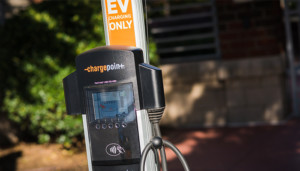 Following six months of stakeholder input, Duke Energy recently filed an additional $56 million proposal of Phase II programs to continue the advancement of transportation electrification in North Carolina.
Following six months of stakeholder input, Duke Energy recently filed an additional $56 million proposal of Phase II programs to continue the advancement of transportation electrification in North Carolina.
The filing follows the November 2020 N.C. Utilities Commission (NCUC) order approving the company’s $25 million Phase I electric transportation pilot program.
In its earlier order, the NCUC instructed Duke Energy to work with the Public Staff to organize a collaborative stakeholder process and then file any stakeholder-developed pilot programs.
“The move to an electric-driven transportation sector will include input from stakeholders from across North Carolina,” said Stephen De May, Duke Energy’s North Carolina president. “Our filing reflects the best ideas we heard on how Duke Energy can spur that transition.”
Although North Carolina has more than 26,000 electric vehicles in the state, Gov. Roy Cooper’s Executive Order 80 set forth a statewide goal of getting 80,000 zero-emission vehicles on the road by 2025.
Duke Energy’s efforts will lead to more than 1,000 charging ports being installed in the state. The company’s Phase II pilot programs will:
- Build on the company’s earlier pilot by expanding DC fast charging on state highways, charging at multifamily dwellings and provide financial support to school systems to purchase 60 electric school buses.
- Support the continued development of the competitive market for DC fast charging by requiring multiple providers of the hardware and software, creating a transparent stakeholder informed process around vendor selection that allows for alternative pricing by site hosts.
- Create a pilot for a tariffed EV charging program for residential and business customers. This program allows for customers to install and operate EV charging stations for a low monthly rate with the customer making all operational choices, including brand of hardware and network. In many cases, this may be a zero upfront cost option for customers charging EVs.
Separate from the Phase II filing, on April 30 the company filed for approval of a make-ready tariff that will provide credits to reduce the upfront cost of upgrading electrical systems to install charging infrastructure for homeowners and businesses.
“High upfront costs prevent our customers from unlocking the substantial benefits of EVs, and this challenge is especially prevalent for low- and moderate-income families,” said Lon Huber, Duke Energy’s vice president of rate design and strategic solutions. “These new programs remove a key financial barrier to adoption, enabling everyone to benefit from the expanded use of electric vehicles.”
Huber added that the collaborative stakeholder meetings in North Carolina will continue to review how the Phase II pilot programs are performing and to discuss innovative ways to expand the EV market, including additional rate designs and programs.


